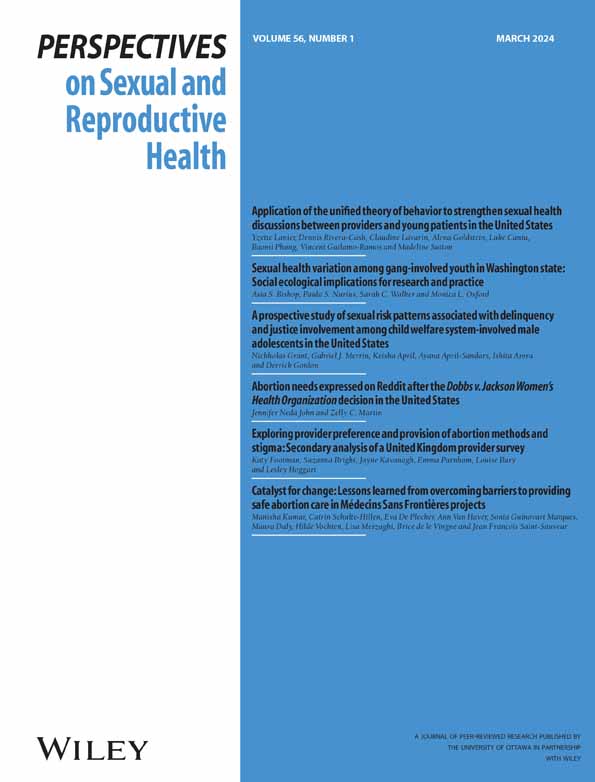Patient experiences using public and private insurance coverage for abortion in Illinois: Implementation successes and remaining gaps
IF 3.5
2区 医学
Q1 DEMOGRAPHY
引用次数: 0
Abstract
ContextInsurance coverage for abortion in states where care remains legal can alleviate financial burdens for patients and increase access. Recent policy changes in Illinois required Medicaid and some private insurance plans to cover abortion care. This study explores policy implementation from the perspectives of patients using their insurance to obtain early abortion care.MethodologyBetween July 2021 and February 2022, we interviewed Illinois residents who recently sought abortion care at ≤11 weeks of pregnancy. We also interviewed nine key informants with experience providing or billing for abortion or supporting insurance policy implementation in Illinois. We coded interview transcripts in Dedoose and developed code summaries to identify salient themes across interviews.ResultsMost participants insured by Illinois Medicaid or eligible for enrollment received full coverage for their abortions; most with private insurance did not and faced challenges learning about coverage status. Some opted not to use insurance, often citing privacy concerns. Participants who benefited from abortion coverage expressed relief, gave examples of other financial challenges they could prioritize, and described feeling in control of their abortion experience. Those without coverage described feeling stressed, uncertain, and constrained in their decision‐making.ConclusionWhen abortion was fully covered by insurance, it reduced financial burdens and enhanced reproductive autonomy. Illinois Medicaid policy—with seamless enrollment options and appropriate reimbursement rates—offers a model for improving abortion access in other states. Further investigation is needed to determine compliance among private insurance companies and increase transparency.伊利诺伊州使用公共和私人保险堕胎的患者经验:成功实施案例与尚存差距
背景在堕胎护理仍然合法的州,为堕胎提供保险可减轻患者的经济负担并增加获得堕胎护理的机会。伊利诺伊州最近的政策变化要求医疗补助计划和一些私人保险计划承保堕胎护理。在 2021 年 7 月至 2022 年 2 月期间,我们采访了最近在怀孕 ≤11 周时寻求堕胎护理的伊利诺伊州居民。我们还采访了九位在伊利诺伊州具有提供堕胎服务或开具堕胎账单或支持保险政策实施经验的关键信息提供者。我们在 Dedoose 中对访谈记录进行了编码,并编写了编码摘要,以确定各访谈中的突出主题。结果大多数参加伊利诺伊州医疗补助计划或符合参保条件的参与者都获得了全额堕胎保险;大多数参加私人保险的参与者没有获得全额堕胎保险,并且在了解保险状况方面面临挑战。一些人选择不使用保险,通常是出于隐私方面的考虑。受益于堕胎保险的参与者表示如释重负,举例说明了他们可以优先考虑的其他财务挑战,并描述了对其堕胎经历的掌控感。结论当堕胎完全由保险承保时,可减轻经济负担,提高生育自主权。伊利诺伊州的医疗补助政策--无缝的参保选择和适当的报销比例--为改善其他州的堕胎机会提供了一个范例。还需要进一步调查,以确定私营保险公司的合规性并提高透明度。
本文章由计算机程序翻译,如有差异,请以英文原文为准。
求助全文
约1分钟内获得全文
求助全文
来源期刊
CiteScore
5.10
自引率
3.40%
发文量
24
期刊介绍:
Perspectives on Sexual and Reproductive Health provides the latest peer-reviewed, policy-relevant research and analysis on sexual and reproductive health and rights in the United States and other developed countries. For more than four decades, Perspectives has offered unique insights into how reproductive health issues relate to one another; how they are affected by policies and programs; and their implications for individuals and societies. Published four times a year, Perspectives on Sexual and Reproductive Health includes original research, special reports and commentaries on the latest developments in the field of sexual and reproductive health, as well as staff-written summaries of recent findings in the field.

 求助内容:
求助内容: 应助结果提醒方式:
应助结果提醒方式:


